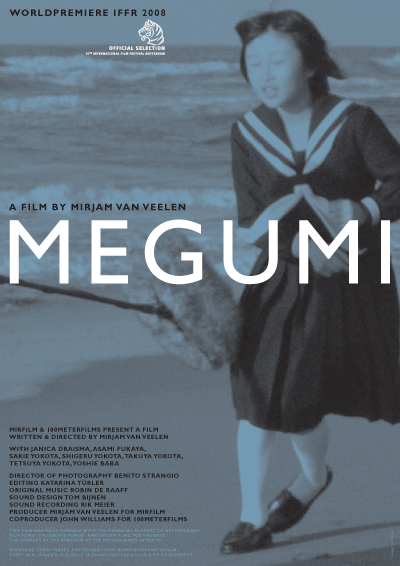BLURRING THE BOUNDARIES BETWEEN DOCUMENTARY AND FICTION |
||
In 1977, on her way back home from school, a 13-year-old Japanese girl, Megumi, was abducted by the North Korean spies. Mirjam van Veelen’s film of the same title moves in-between the genre of documentary and drama. The film can be seen as an emotional testament to the experience of loss and love, as well as a political claim about the right to life perceived as the right to be free to imagine a future. Megumi is a personal tragedy yet deeply political since it ends with a tension between two nations. It is an intimate journey of loss, recovery and hope, always already ‘written’ within the political field of international conflicts and diplomacy. Starting as ‘a film within a film’ event, the camera becomes the eye that records historical facts, the mute interlocutor, the listener that encourages the family and the teacher to narrate, repeat and thus re-produce this story of loss and hope. |
The way Megumi is shot makes the viewer feels like he/she goes through a mourning process and re-appropriation of the loss of the beloved the same way as her family did. Re-visiting the real location where abduction took place, following an imaginary path of Megumi’s painful journey, watching political facts and actions that have surrounded this event in the last 30 years, the spectator cannot but be enmeshed into the experiencing of loss: of the beloved, of innocence, of childhood and of future. Drawing on all sorts of different material – historical footage, photos, personal narratives – this film runs as a recreation of a strange human story, full of twists, which with its intriguing and compelling narration blurs any clear distinctions between fiction and reality, the ordinary and the extraordinary.Megumi invites the spectator to encounter and accept the unexpected by sympathising with the uncanny story of an ordinary banker and his wife, who find themselves caught up in a life they could never have imagined, nor have they chosen. In other words, the film’s narrative engages with the tensions between the individuals and their fate, bringing into the fore the struggling that takes place between the individual and society. Moving in between different scenarios of what could have happened to Megumi for the last 30 years (the Korean authorities claim she committed suicide, while the family prefers the version that Megumi got married and has a family), this film becomes an exploration of the mystery of life itself, as an ongoing story of hope, belief and love. The use of mediated images of landscape (e.g. the sea, the forest) opens up and binds tightly the subjective experience of an individual life to the world. Far from being a dark tale about trauma, this documentary re-affirms life as being primarily about hope and faith for the future. Megumi is not absent but fully present in this story: an elusive figure that prays over an ideal future: “…in my ideal of the future I hope to bind together my talents, my dreams and reality” state Megumi’s words at the beginning of the film.
Dr Chrysanthi NigianniVisiting Lecturer in Sociology, University of East London |
|